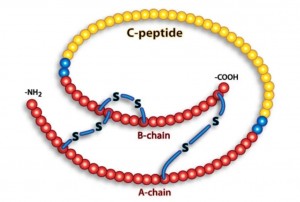C-peptide is an important marker in the insulin synthesis process and is usually used to evaluate pancreatic function and insulin secretion. Although C-peptide may be clinically important in certain circumstances, it is not suitable as a routine testing tool for blood glucose management.
First, C-peptide levels do not directly reflect blood sugar levels. Although the secretion of C-peptide is closely related to the secretion of insulin, changes in blood sugar are affected by many factors, including diet, exercise, stress response, etc. Therefore, relying solely on C-peptide to evaluate the effect of glycemic control is not comprehensive enough.
Second, C-peptide has a longer half-life and typically remains in the blood longer than insulin. This means that in some cases, C-peptide levels may remain within the normal range even though a patient’s blood glucose levels have increased, leading to a misjudgment of insulin secretion status.
In addition, the detection of C-peptide requires specific laboratory equipment and techniques, and its results may be affected by sample handling and detection methods. This makes the detection of C-peptide less convenient and common than blood glucose monitoring in clinical applications.
Ultimately, the goal of glycemic management is to maintain blood glucose within the normal range, which often relies on patient self-monitoring and adjustment of insulin therapy. Although C-peptide can provide some information about insulin secretion, it cannot replace the importance of blood glucose monitoring in daily management.
In summary, although C-peptide has clinical value in some specific situations, it cannot be used as a routine testing tool for blood glucose management due to its limitations.
We beaysen medical have C-peptide test, Insulin test and HbA1c test for diabetes management .
Post time: Oct-09-2024
